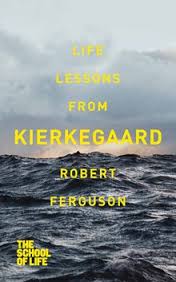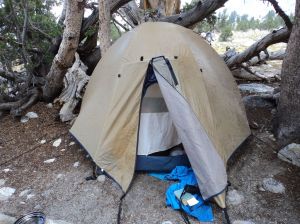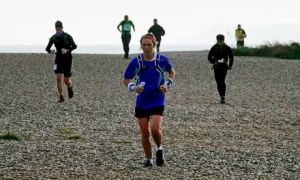I had imagined plenty of endings to the Norfolk Ultra a couple of weeks ago, but standing on a roadside puking my guts out in front of a guy who had rowed across both the Atlantic and the Indian Ocean was not one of them.
The original idea had been simple – idyllic, really. Hire a cottage on the Norfolk coast, take the boys out and do a bit of twitching and then pull on the shorts and run along the beach for 100km. It was all part of a roadmap back to Athens next year. Mrs H had reluctantly given me the nod to have another go at the Spartathlon, almost every step of which I had followed this year on twitter since both boys had been up during the night.
I could give you all the excuses: six months of running lost this year because of bruised cartilage under the kneecap; only five weeks of 50+ miles of training prior to the race; arriving at the campsite at 11.30pm to put up a tent in a howling gale with the raining pouring in. (I had not put up a tent – even in daylight – since 2001). It did not help either that, once the race had started, we clocked up an extra two miles because someone had moved the signs – and that was before we reached the pebble beach.
I had spent the best part of the week before preparing myself for all these eventualities – the organisers, who had left no stone unturned in trying to get us through this, had taken the time to put together a power point presentation that took you through every turn and incline. I had watched it so many times that I managed to convince myself that legs don’t forget, that all I had to keep my head straight.
The first four hours gave me exactly what I came here for. This is Sebald country – flat, melancholy, profoundly silent – there were moments when I was running on my own across the salt marshes that I thought if I lay down no one would ever find me. On another day this would have been dispiriting, but four months to the day since Émile was born we’ve barely had a four hours straight to sleep through, let alone to empty the head.
In the end it was the stomach that did for me. I would like to think that if I had stopped at the fish and chip shop and filled a gap, rather than slow to a jog to savour the waft of salt and vinegar – the kind of smell that either makes you salivate or recoil in horror and reach for your pulses – then I would have been able to bludgeon on, even when 10.5 hours ceased to be realistic. In truth, though, I was all over the shop, and where my stomach went my head followed too quickly – a sure sign that I didn’t have enough miles in me to do the race justice, and that was before we got off the second beach. There’s a certain inevitability to standing by a roadside with your hands on your knees that all runners nod their head to. Usually it comes around the 20-hour mark, though, not six hours.
So, best-laid plans have gone to waste, and alongside another DNF – the second of the year – comes the almost (inevitable?) certainty that I won’t be going back to the Spartathlon in 2014. Never have I wanted something more than to have been taking part in that race.
 I woke on the Sunday morning to more rain, and, in the dark, lumbered downstairs to read Robert Ferguson’s book on Soren Kierkegaard before the boys woke up. The central lesson that Kierkegaard teaches is that we need to ‘wake up’, to step out of our daily routine which leaves closed off the real reason why we should get up in the morning – to live more vitally. This is what Norfolk was supposed to have been – a stepping towards Sparta, a peeling away of the daily sludge that would take me back to the hills south of Corinth where something inside me broke and I felt, for the first time, what it was like to really be alive. The irony, though, is not lost on me that Norfolk really did serve as a wake up. As Kierkegaard says in Repetitions – there is no point going back to look for something by trying to recreate the past. I think, for the first time, I have started to accept that the person who tried and failed at the Spartathlon is dead. While I may be the last person to have noticed it, I have become someone else – perhaps I’ve even grown up. It is time to bury that other self for good.
I woke on the Sunday morning to more rain, and, in the dark, lumbered downstairs to read Robert Ferguson’s book on Soren Kierkegaard before the boys woke up. The central lesson that Kierkegaard teaches is that we need to ‘wake up’, to step out of our daily routine which leaves closed off the real reason why we should get up in the morning – to live more vitally. This is what Norfolk was supposed to have been – a stepping towards Sparta, a peeling away of the daily sludge that would take me back to the hills south of Corinth where something inside me broke and I felt, for the first time, what it was like to really be alive. The irony, though, is not lost on me that Norfolk really did serve as a wake up. As Kierkegaard says in Repetitions – there is no point going back to look for something by trying to recreate the past. I think, for the first time, I have started to accept that the person who tried and failed at the Spartathlon is dead. While I may be the last person to have noticed it, I have become someone else – perhaps I’ve even grown up. It is time to bury that other self for good.
Still, on the upside, I did manage to keep one promise – having lost 5kg in 5 weeks, mostly by running in a black bin liner everyday – I am under 80kg for the first time since I hit puberty.


Hi Robin
This is an unexpectedly moving post. The Spartathlon is not to be next year. That much is clear. You’re exhausted. That much is clear. Your reading of Kierkegaard is clear too. But, and here’s the point, the ultra and all of the draining, painful, exhausting preparations are not about history. They are about the latent potential of the future. Each footstep reveals this. You are right. The person that tried and failed at the Spartathlon is dead; the urge, the need, the itch, the reason to have another go isn’t. Robin, you protest too much. I think that I wrote, when I orginally reviewed your wonderful book, that ‘Why We Run’ didn’t really answer that question. Rather it explored who we are. Put down the philosophy, get back to the river. Run. Run because the Spartathlon will still be there long after the self isn’t. And that’s the point.